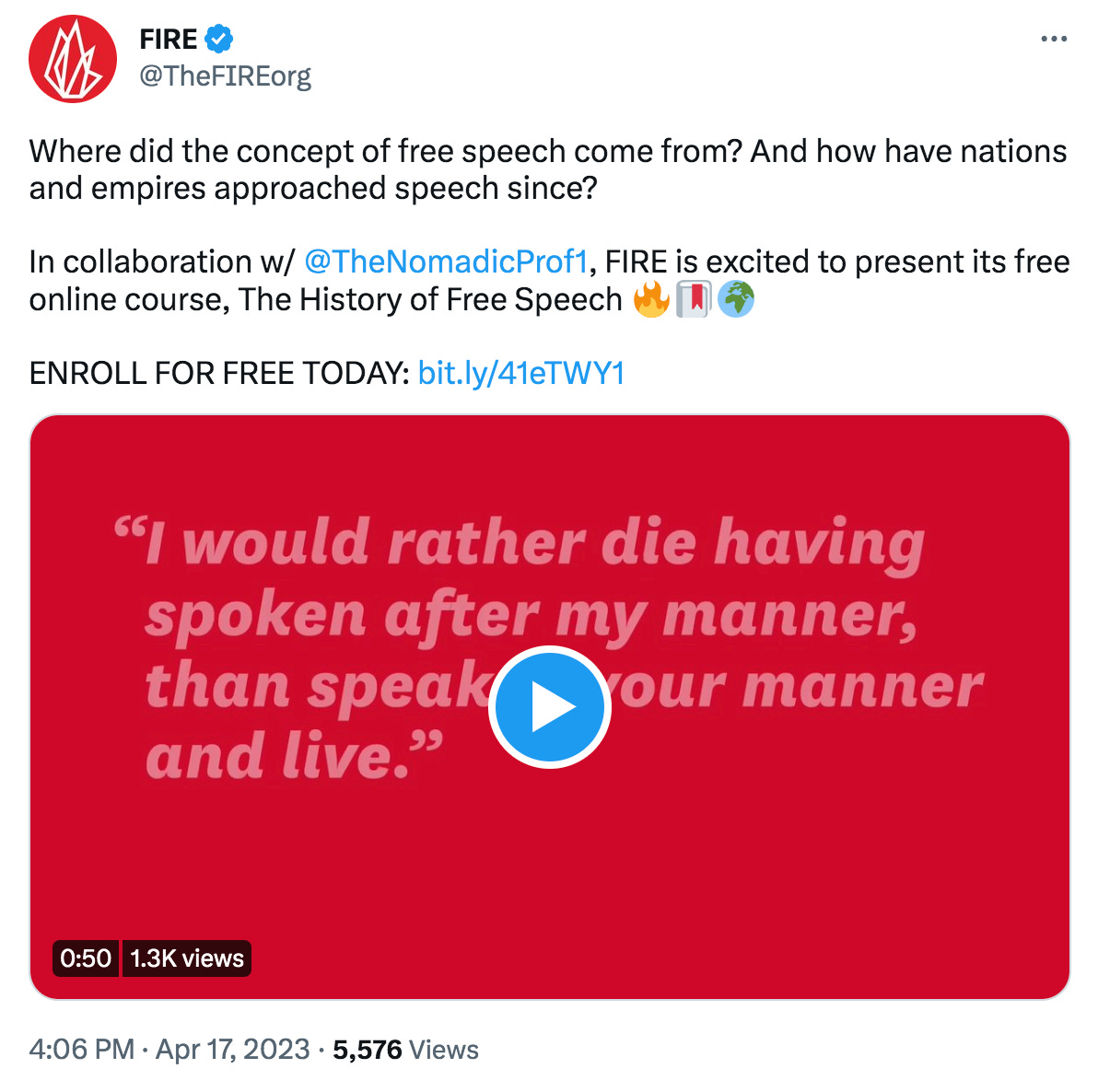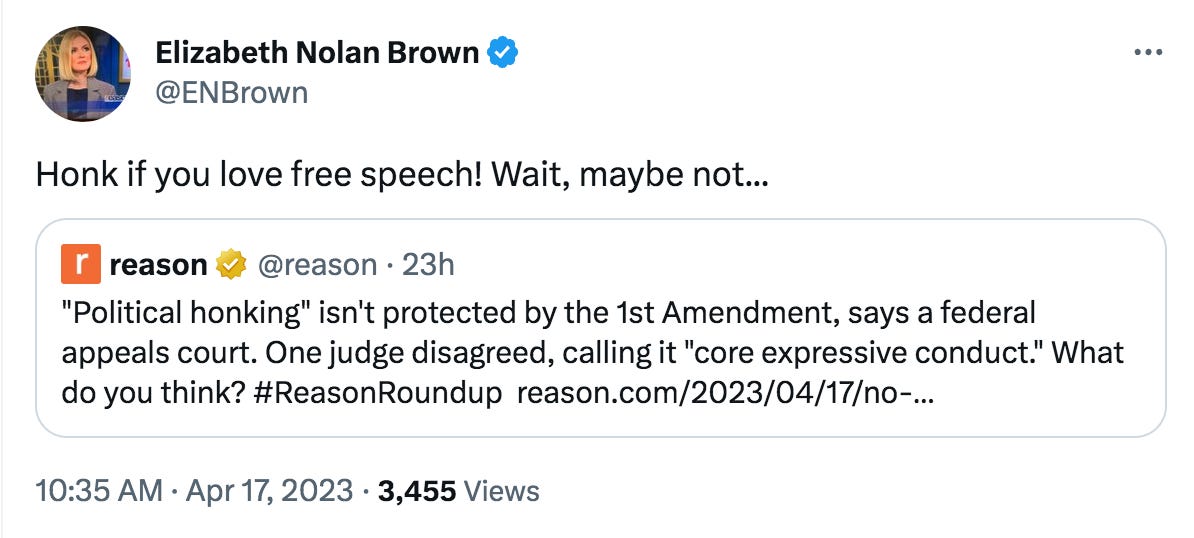E-Pluribus | April 18, 2023
Hurrah, hurrah, hurrah for campus free speech, less two hurrahs; louder doesn't equal right; and the center fights back.
A round-up of the latest and best writing and musings on the rise of illiberalism in the public discourse:
George Leef: One Cheer for Free Speech on Campus
There’s plenty of bad news for free speech on college campuses, but it’s not all bad. Writing for the James G. Martin Center for Academic Renewal in North Carolina, George Leef finds at least one reason for optimism in a new book by University of Pennsylvania professor Sigal Ben-Porath.
How should campus officials react when students complain that speech hurts them? In days gone by, they would have done nothing, leaving it up to those who disagree to find ways of expressing their thoughts. Ben-Porath, however, argues that in such cases, schools have the burden of “supporting” the students and fostering not just more but “better” speech. That puts school officials in a position of having to take sides when students complain that they were upset at hearing something. They’re supposed to sponsor events to assuage the students and counteract the “hurtful” speech.
That’s a bad idea and not just because it’s a one-way street—we know that the complaints will always be against those who challenge “progressive” ideas and never against speakers like, say, Ibram X. Kendi, who says that anyone who doesn’t accept his “antiracist” agenda must be a racist. It’s a bad idea because a big part of maturing (something that’s supposed to happen in college) is to accept that if you don’t like what someone says, it’s your responsibility to formulate a persuasive response. Ben-Porath’s admonition to colleges to take action against “controversial” speech interferes with students learning to fight their own intellectual battles.
[ . . . ]
Repeatedly, Ben-Porath expresses her sympathy for students (and others) who have been “harmed” by insensitive speech. In a remarkable passage, she writes about legislation to end Critical Race Theory (CRT) teaching in public schools and court cases such as Masterpiece Cakeshop (holding that Colorado had illegally punished a baker for declining to bake a cake for a gay wedding) and Meriwether v. Shawnee State (holding that a professor could not be fired because he didn’t want to use a student’s preferred pronouns). She declares that speech protection has been used “as a tool to allow the powerful—business owners and corporations, professors and employers, police and administrators—to silence and censor those under their authority, especially those who aim to dissent or are members of minority groups.”
That claim is absurd. It is perfectly reasonable for public officials to want to stop divisive and misleading CRT teaching that takes time away from real subjects; many parents of all races have demanded that they do so. When Jack Phillips declined to bake a cake for a gay wedding, he wasn’t silencing anyone, merely declining to do something that conflicted with his beliefs. When Professor Nicholas Meriwether used what a student declared were the wrong pronouns, he censored no one.
Read it all here.
Berny Belvedere: Trigger Happy
Clickbait is nothing new, and Berny Belvedere at Arc Digital is fed up with supposed serious participants in public discourse using ginned up outrage to attract readers (or listeners). The strength of our arguments should be what compels others to hear what we have to say, not the volume of our tirades or the magnitude of our hyperbole.
Across the various subcultures that comprise the progressive-critical center and right—the antiwoke crowd, the Intellectual Dark Web, “radical center” rationalists, science triumphalists, message board atheists, and anti-social justice types—offensiveness is sometimes treated as if it were inherently valuable.
The best defense I can give this perspective is that, in a time of seriously heavy-handed intellectual suppression, to be transgressive is to be willing to tell forbidden truths.
You might be thinking to yourself, “Well, yeah! That’s precisely the current state of things!”
It’s actually not. People—regular folks, the underclass, political dissidents, non-elites, etc.—have never had more tools at their disposal by which to speak, and with which to amplify their speech.
Which means that when an online subculture constructs its self-identity around the idea that society won’t allow us to tell the truth, when that becomes its unifying theme and rallying cry, a funny thing happens: its very success actually disconfirms its guiding insight.
We victims of digital tyranny, kept from telling the truth, our large platforms, our impressive revenue streams, our vast followerships, all of it testifying to the truth of our message that we are being intellectually suppressed.
This isn’t Solzhenitsyn being sent to the Gulag; this is Catturd2 complaining about being shadowbanned.
Read the whole thing.
David French: The Moral Center Is Fighting Back on Elite College Campuses
Extremes grab attention, but David French writes in his New York Times newsletter that the two sides tend to overlook many in the middle who believe there’s a third way. The First Amendment, French says, is not owned by a single party but is rather “an American value,” and there are some on college campuses in the center that are starting to push back.
It’s important to emphasize that the fight over free speech on campus is not left versus right. Attempts to suppress ideas and stifle speech come from both ends of the political spectrum. The faculty and administrators at Stanford, Cornell, Harvard and Chicago who are making their stands aren’t a collection of conservatives taking on woke college students. Instead, they represent the moral and legal center of the American academy taking on the extremes.
Left and right tend to challenge free speech on campus in different ways. Left-leaning students have led shout-downs and disrupted events, while right-leaning legislators have passed or considered laws stifling the expression of controversial ideas about race and gender. Both sides have proved capable of mobilizing online outrage to punish professors who offend their constituencies.
The First Amendment cannot be tied to one side of our partisan divide. It’s not a Republican value or a Democratic value but rather an American value, and it’s a value that’s particularly important in the academy.
[ . . . ]
America’s most elite academic institutions can, in fact, demonstrate conviction. The “passionate intensity” of the extremes remains, but the center can hold. Douglass was correct. Free speech is the “dread of tyrants,” and sustaining that freedom — against left-wing protests and right-wing lawmakers — will preserve America’s democratic experiment. There is no path to American equality or justice absent the freedom of speech.
Read it all.
Around Twitter
The Foundation for Individual Rights & Expression offers, appropriately enough, a free Free Speech course. Here’s a short video outlining what it covers (click this link since Twitter embedding isn’t working.)
Via Reason’s Elizabeth Nolan Brown, a burning question of the day: is honking protected speech?
And finally, Colin Wright hits on a novel idea to protect his credentials:










